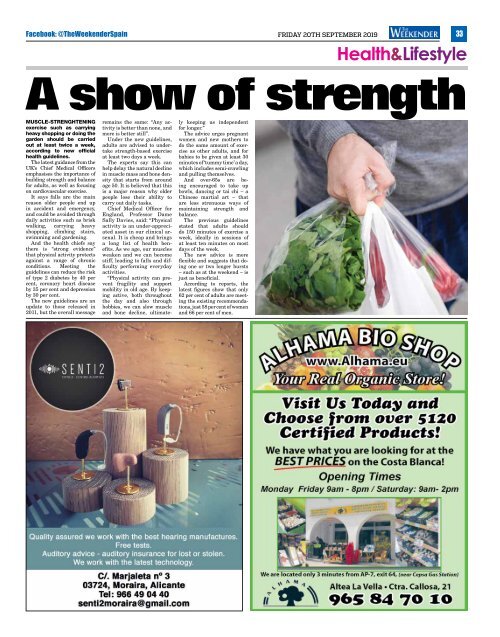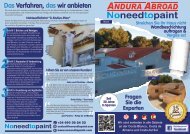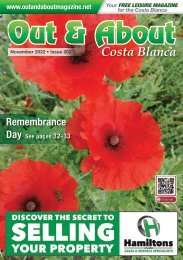You also want an ePaper? Increase the reach of your titles
YUMPU automatically turns print PDFs into web optimized ePapers that Google loves.
Facebook: @The<strong>Weekender</strong>Spain<br />
FRIDAY 20TH SEPTEMBER 2019 33<br />
Health&Lifestyle<br />
A show of strength<br />
MUSCLE-STRENGHTENING<br />
exercise such as carrying<br />
heavy shopping or doing the<br />
garden should be carried<br />
out at least twice a week,<br />
according to new official<br />
health guidelines.<br />
The latest guidance from the<br />
UK’s Chief Medical Officers<br />
emphasises the importance of<br />
building strength and balance<br />
for adults, as well as focusing<br />
on cardiovascular exercise.<br />
It says falls are the main<br />
reason older people end up<br />
in accident and emergency,<br />
and could be avoided through<br />
daily activities such as brisk<br />
walking, carrying heavy<br />
shopping, climbing stairs,<br />
swimming and gardening.<br />
And the health chiefs say<br />
there is “strong evidence”<br />
that physical activity protects<br />
against a range of chronic<br />
conditions. Meeting the<br />
guidelines can reduce the risk<br />
of type 2 diabetes by 40 per<br />
cent, coronary heart disease<br />
by 35 per cent and depression<br />
by 30 per cent.<br />
The new guidelines are an<br />
update to those released in<br />
2011, but the overall message<br />
remains the same: “Any activity<br />
is better than none, and<br />
more is better still”.<br />
Under the new guidelines,<br />
adults are advised to undertake<br />
strength-based exercise<br />
at least two days a week.<br />
The experts say this can<br />
help delay the natural decline<br />
in muscle mass and bone density<br />
that starts from around<br />
age 50. It is believed that this<br />
is a major reason why older<br />
people lose their ability to<br />
carry out daily tasks.<br />
Chief Medical Officer for<br />
England, Professor Dame<br />
Sally Davies, said: “Physical<br />
activity is an under-appreciated<br />
asset in our clinical arsenal.<br />
It is cheap and brings<br />
a long list of health benefits.<br />
As we age, our muscles<br />
weaken and we can become<br />
stiff, leading to falls and difficulty<br />
performing everyday<br />
activities.<br />
“Physical activity can prevent<br />
fragility and support<br />
mobility in old age. By keeping<br />
active, both throughout<br />
the day and also through<br />
hobbies, we can slow muscle<br />
and bone decline, ultimately<br />
keeping us independent<br />
for longer.”<br />
The advice urges pregnant<br />
women and new mothers to<br />
do the same amount of exercise<br />
as other adults, and for<br />
babies to be given at least 30<br />
minutes of ‘tummy time’ a day,<br />
which includes semi-crawling<br />
and pulling themselves.<br />
And over-65s are being<br />
encouraged to take up<br />
bowls, dancing or tai chi – a<br />
Chinese martial art – that<br />
are less strenuous ways of<br />
maintaining strength and<br />
balance.<br />
The previous guidelines<br />
stated that adults should<br />
do 150 minutes of exercise a<br />
week, ideally in sessions of<br />
at least ten minutes on most<br />
days of the week.<br />
The new advice is more<br />
flexible and suggests that doing<br />
one or two longer bursts<br />
– such as at the weekend – is<br />
just as beneficial.<br />
According to reports, the<br />
latest figures show that only<br />
62 per cent of adults are meeting<br />
the existing recommendations,<br />
just 58 per cent of women<br />
and 66 per cent of men.

















